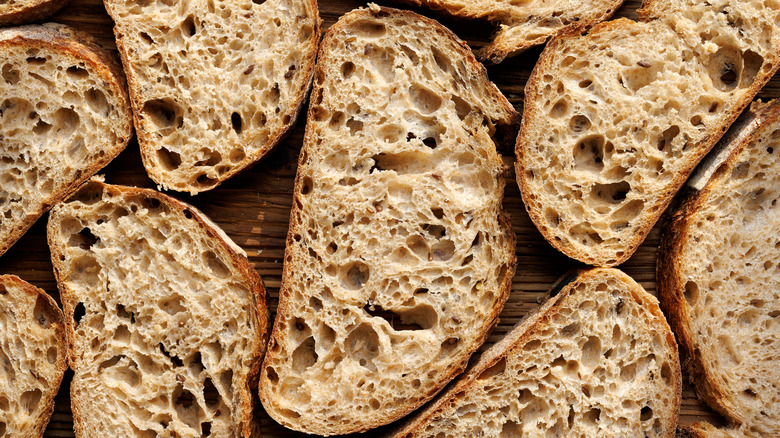Eating Sourdough Bread Has An Unexpected Effect On The Way You Age
If you were one of the people who took to making your own sourdough bread during the pandemic or if you've loved the pronounced tangy taste of this type of leavened bread always, you're probably already aware of the health benefits of eating more sourdough bread. Since it relies on a starter that contains wild yeast and lactic acid bacteria (unlike regular bread that employs baker's yeast), it's supposed to be richer in nutrients and easier on your gut. The latter reason also makes this bread better for people with digestive issues like irritable bowel syndrome (IBS). Sourdough bread contains a lot of calcium, potassium, magnesium, folate, and niacin. The antioxidant profile of the bread has been linked to disease prevention. All of these (and more) reasons make this type of bread a good choice for people looking to age healthily, per experts.
In fact, according to a 2019 study published in Aging Clinical and Experimental Research, which looked at the aging-related health markers of southern Mediterranean populations, regular consumption of wholemeal sourdough bread was associated with a reduced risk of coronary heart disease, diabetes, and cancer. It helps that sourdough bread, with its low glycemic index, won't cause blood glucose spikes and crashes like regular refined white bread would. This could be beneficial for older persons trying to regulate their blood sugar levels. Let's take a closer look at why sourdough bread might be healthier than you think and what it can do for the way you age. We can start with how this leavened bread influences your gut health.
The gut and aging connection: How sourdough bread can help
The prebiotic content in sourdough bread helps maintain a healthy gut. Eating fermented foods (like sourdough bread) can promote gut microbial diversity and combat inflammation in your body, per a 2021 study published in Cell. Fermentation increases the antioxidant activity of foods and provides anti-hypertensive and anti-diabetic benefits to consumers, according to a 2019 study published in Nutrients.
As explained by genetics professor and author, Tim Spector (via Zoe), "The gut microbiome holds the key to healthy aging, both as an indicator of health and by its influence on the immune system and the body's natural repair mechanisms." Having a healthy gut can help you combat diseases that are commonly associated with aging, like cardiovascular disease and diabetes. In fact, eating sourdough bread has an unexpected effect on your heart. What's more, the gut-brain connection of maintaining a healthy gut means that you're also helping protect your brain and mental health as you age. In addition to combating health concerns like depression and anxiety, you're also helping your cognitive function. There's more that sourdough bread can do for you as you age and it has to do with its nutritional value and how it's absorbed by your system.
The nutritional value of sourdough bread
Not only does sourdough bread contain essential nutrients important for healthy aging (like calcium, potassium, and folate), but the fermentation process it goes through makes for easier absorption of nutrients, per experts. Aging impacts the efficiency at which your body absorbs nutrients. Consuming sourdough bread could potentially help combat this problem. "When you consume fermented foods, it becomes easier for your digestive system to absorb important minerals such as zinc, magnesium, and iron that are key for maintaining healthy bones as you age. This is because the phytate present is broken down, and phytate impairs mineral absorption," explained registered dietician, Jinan Banna (via Well+Good).
The calcium in sourdough bread is important for bone health, potassium helps reduce your risk of osteoporosis, kidney stones, high blood pressure, and stroke, while folate is key for a healthy nervous system and cognitive function. Even so, consuming sourdough bread may not be as simple as buying the first product you see at a supermarket. Experts recommend the whole-grain variety in favor of the white kind. Research has also noted the challenges of assessing the health benefits of this bread because of the many different ways in which it's made. While some experts think that purchasing whole-grain sourdough bread from a local bakery that specializes in the product is best, others suggest you can make it at home. Be mindful, however, that dealing with starters and other ingredients should be done with caution because of how easily they can become contaminated. You may also want to avoid eating sourdough if you're on certain medications.


